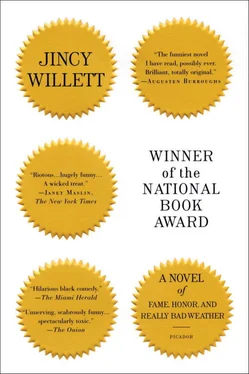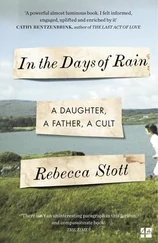Abigail glanced my way. “What are you doing here?” she asked, in an absurdly conversational tone, as though I had barged in on her in the bathroom. “Look, would you do me a favor? Captain Courageous is stuck in there. Would you help him out?”
“Help him what?” I had found my voice at last. “Help him kill you?”
Abigail smiled at me, in a superior way. “You always take everything so seriously. He’s not going to do anything. He never does. Just get him out of there. He’s such a fucking baby.”
Numbly I went down to the entrance to the Squeeze, and there he was. Not stuck, but slumped down near the entrance, his back against one wall, his head in his hands. The air reeked of bourbon, and there were glass shards all over the ground. Thank God for that. It gave me myself back. “Pick that up,” I said to him. “Pick up every single piece of glass.”
“I’ll cut myself,” he said.
“Little children come to this place,” I said. “Pick it up right this minute!”
And he did, every piece, and walked back to the park entrance with the broken glass cupped in his hands, and dumped it in a trash can, and he didn’t cut himself. Nor did he say another word. We drove home in silence, as the short day waned and the sky got darker still, until, within a mile of Watch Hill, I told them that I would be leaving for good in the morning. Abigail said she understood. Conrad said nothing. A single tiny snowflake settled on my windshield, melting immediately, and just before I pulled into the driveway, another settled in its place. I’d have to get an early start tomorrow. With snow, you never know.
Chapter Twenty-One
The Great Blizzard of 1978
Snow heavy at times tonight. Probable accumulations of 8 to 16 inches. Windy with drifting, Snow ending tomorrow. Low tonight in teens. High tomorrow in the 20s. Northeast winds 25 to 40 mph tonight and north winds 25 to 35 mph tomorrow.
I slept poorly Sunday night, partly out of guilt about my impending escape, but mostly because of those two tiny snowflakes on my windshield and the real possibility of coming awake to a storm and finding myself snowed in with George and Martha at Agincourt. I didn’t achieve real sleep until four in the morning, and when I woke up it was almost noon. Of course they’d let me sleep. And it had indeed begun to snow, in big fat flakes. But the road outside my windows was reasonably clear, and I saw no good reason to change my plans.
It’s worth noting that tens of thousands of Rhode Islanders took to the highways that day in the identical casual, can-do spirit. And in the intervening years those same people, when presented with the veriest dusting of snow, race to the nearest supermarket and strip its shelves of bread and milk. Since that day, nothing panics us, here in the Panic State, like snow.
Conrad stayed in bed. Abigail helped me carry my stuff to the car. She wouldn’t come with me, and I was through arguing with her. I told her to get the Plymouth fixed, or else she’d be housebound. I promised to call her that night, from Frome. I started the car, and she leaned into the window and kissed me. “Tell Anna I love her,” she said, and straightened up, her face expressionless. And still I backed out of the driveway as she waved me off, and headed off for home, her kiss still moist on my cold cheek.
We never kissed, ever. As I drove north on the Westerly road the drying kiss puckered my skin like paper glue. After two miles I thought I could feel it still, and I didn’t raise my hand to rub it away. Abigail hadn’t meant to make me worry; she was manipulative with everyone else, but not with me. She was not, is not, the suicidal type. True, at the Lemon Squeeze she had appeared bent on her own destruction, but appearances had deceived me. She was right about Conrad. He was no danger to her, at least not at that moment. I put the mystery of that kiss out of my mind, and concentrated upon enjoying my freedom.
There were quite a few cars on Watch Hill Road that day, parading north at a sedate pace, and at first I had no trouble following the navy blue Lincoln in front of me. I have always loved to drive in this kind of snow. It’s not particularly slippery, and it puts a hush over the road, and the more thickly it closes in, the safer you feel, domed in white, as in a child’s merry paperweight. I listened to the Jupiter Symphony on ’GBH, then turned it off for the silence, because they were prattling on too much about the foolish weather.
By the time I got to the Airport Road I couldn’t see the outlines of the Lincoln anymore, just the red smudge of its lights, and the wind began to pick up. That there were still other cars on the road quickly became something I had to take on faith, because as far as I could see, there was me and that Lincoln, and I tried to recall if I had ever known anything as white as this day. We slowed to a belly-crawl. I had absolutely no idea where we were. After I had driven for an hour I checked the odometer: I had come seven miles.
Wherever that Lincoln was going, I was going too. It turned out that it was headed, not for Frome, which would have been way too much to hope for, but for Ashaway, at the outskirts of which we each came to a wheel-spinning stop. I tried rocking the car, but it was hopeless. After debating whether to take anything with me (no, I decided; if I have to, I can always come back), I emerged into the howling white, no boots on my sneakered feet, and made my way over to the Lincoln. An older couple emerged, and together, wordlessly, hunched forward at the waist, we descended into Ashaway.
We stopped at the first shelter we came to, an oblong concrete structure on the outskirts of town. We could see the outline of a sign on the roof, but couldn’t begin to read it. All that mattered, anyway, was that you could see lights inside, and it looked warm. So it was that at one P.M. on February 6, 1978, I came to Rocco’s Famous Sport & Trophy.
Rocco himself ushered us into a long room cluttered with duck decoys, waders, half-opened boxes of hunting boots, basketballs, pool cues, and eight other people, all of them clearly sheltering from the storm. Before the day was through six more straggled in. Rocco kept us all supplied with coffee and hot chocolate, and we gathered around a small black and white television set and listened to the day’s events unfold, there being nothing to watch except talking heads and archived films of old blizzards. The announcers were snowed in too, as were mobile cameras, spy-in-the-sky helicopters, police cruisers, ambulances, fire trucks, and, most significantly, snowplows.
By suppertime I was ready to face the prospect of spending the night in a motel, at which I was informed by the Lincoln couple that there were no motels in Ashaway. They themselves lived in Ashaway, but on the other side of town. Fifteen of us, plus Rocco, would have to bed down at the Sport & Trophy. Our host, a prince among men, unpacked sleeping bags and army cots and inflatable rafts, and while we lined up to use his phone he grabbed a Coleman lantern and set out for a nearby convenience store. We stood in the open door and watched the swirling white swallow up Rocco and his brave little light.
Anna answered the phone on the second ring. She had two high school friends with her, stranded on what was supposed to be an afternoon visit, and they’d built a fire in the fireplace, cooked and eaten dinner, and washed up. They were having a fabulous time. She was happy to hear from me, but only because she’d been worried, and I gave her the number at Rocco’s and promised to see her some time tomorrow.
Half an hour later, just when we were about to send out a rescue party, in blew Rocco, quilted in snow, bearing a plastic garbage bag full of plunder. “Sorry, folks,” he said, “somebody else must have had the same idea. All I got is snack crap and stuff.” There had been no one in the store, he told us, and the door was wide open, and there wasn’t a loaf of bread or a carton of milk in the place.
Читать дальше












